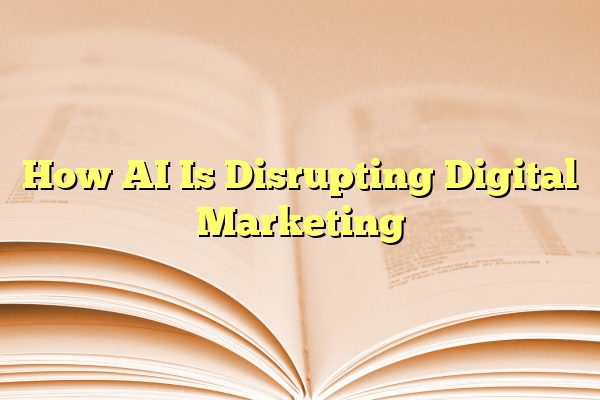
How AI Is Disrupting Digital Marketing
Artificial intelligence (AI) is radically transforming the landscape of digital marketing. What was once a labor-intensive and data-heavy task for marketers can now be automated, optimized, and predicted with remarkable precision, thanks to AI. From enhancing customer engagement to generating real-time personalized content, AI is proving to be a game-changer for businesses of all sizes.
AI-powered tools and algorithms are helping marketers reach the right audience at the right time using the right message, setting a new standard for how digital campaigns are created and delivered. Brands that adopt these technologies are gaining a competitive edge by offering superior user experiences and improved return on investment (ROI).
Contents
1. Personalized Customer Experiences
One of the most significant impacts of AI in digital marketing is the ability to deliver hyper-personalized experiences to users. Traditional marketing methods relied heavily on segmented demographics, but AI takes personalization to a new level by analyzing individual behavior, search patterns, and preferences in real time.
AI-driven recommendation engines, similar to those used by platforms like Netflix and Amazon, allow marketers to suggest relevant products or content, improving customer satisfaction and loyalty.

2. AI-Powered Content Creation
Content is still king, but with AI, creating and optimizing content has become more efficient than ever. AI tools can generate written content, curate topics based on trending data, and even suggest optimizations to increase engagement. For instance, natural language processing (NLP) algorithms can write product descriptions, ad copy, and even entire blog posts.
Moreover, AI can analyze which types of content perform best among a target audience and guide marketers’ editorial strategies accordingly.
3. Intelligent Chatbots and Customer Service
AI-driven chatbots now offer 24/7 customer service with immediate response times. These bots can answer frequently asked questions, direct users to relevant resources, and even assist in purchases—all without human intervention.
By integrating AI chatbots into websites and social media platforms, businesses provide a seamless interaction experience while drastically reducing support costs.
4. Predictive Analytics and Lead Scoring
AI enables marketers to forecast future consumer behavior based on historical data patterns. Predictive analytics helps in identifying high-value leads, optimizing funnel performance, and improving campaign strategies.
This leads to more informed decisions, better ROI, and greater alignment between marketing and sales teams. AI-powered lead scoring systems, for example, can prioritize potential customers most likely to convert.

5. Enhanced Ad Targeting and Programmatic Advertising
AI has revolutionized the way digital advertising works by making ad targeting more efficient and accurate. Using data analysis and machine learning, advertisers now create smarter ad placements that resonate with user intent and behavior.
Programmatic advertising, powered by AI, automates the buying of ads and targets audiences more precisely than traditional advertising methods, ensuring better engagement and conversion rates.
Conclusion
AI is no longer a futuristic concept; it’s a vital component of modern digital marketing strategies. By streamlining processes, enhancing personalization, and analyzing vast amounts of data in real time, AI enables marketers to be more adaptive, insightful, and effective than ever before.
As AI continues to evolve, it is set to drive even more innovations, making now the perfect time for marketers to invest in understanding and implementing AI technologies across their campaigns.
Frequently Asked Questions (FAQ)
- Q: How does AI improve customer targeting?
A: AI analyzes user behavior, preferences, and past interactions to create detailed customer profiles, allowing marketers to deliver personalized content and advertisements. - Q: Can AI create content without human help?
A: Yes, AI tools using natural language processing can generate readable and relevant content such as product descriptions, blogs, and social media posts. However, human oversight is often still necessary for tone and quality control. - Q: What are some examples of AI in digital marketing?
A: Examples include AI chatbots, personalized email campaigns, dynamic ad placements, predictive analytics, and content optimization tools. - Q: Does using AI reduce marketing jobs?
A: Not necessarily. While AI automates many routine tasks, it also opens up new roles in AI management, data analysis, and strategy, helping marketers focus on higher-level creative and strategic efforts. - Q: Is AI affordable for small businesses?
A: Many AI solutions offer scalable options, making them accessible to small and mid-sized businesses. Tools like chatbots, email automation, and ad optimization are available at various price points.
